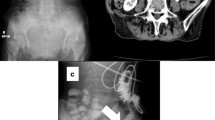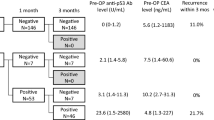Abstract
Background
Significance of serum appearance of anti-p53 antibody in breast cancer has not been discussed fully.
Methods
The relationship between serum appearance of anti-p53 antibody and the clinicopathological features was investigated on the basis of the data of 42 women with breast cancer who had been treated with surgical resection.
Results
The proportion of tumors with histological grade 3 was significantly higher among tumors with serum appearance of anti-p53 antibody (P = 0.020). The proportion of triple negative tumors was also significantly higher among tumors with serum appearance of anti-p53 antibody (P = 0.003).
Conclusions
Preoperative appearance of anti-p53 antibody in sera can be correlated with the incidence of triple negative breast cancer and could therefore help identify tumors with aggressive potential.
Similar content being viewed by others
References
Hollstein M, Sidransky D, Vogelstein B, Harris CC. p53 mutation in human cancers. Science. 1991;253:49–53.
Soussi T, Legros Y, Lubin R, Ory K, Schlichtholz B. Multifactorial analysis of p53 alteration in human cancer: a review. Int J Cancer. 1994;57:1–9.
Forslund A, Kressner U, Lindmark G, Inganas M, Lundholm K. Serum anti-p53 in relation to mutations across the entire translated p53 gene in colorectal carcinomas. Int J Oncol. 2001;19:501–6.
Shimada H, Shiratori T, Takeda A, Matsushita K, Okazumi S, Akutsu Y, et al. Perioperative changes of serum p53 antibody titer is a predictor for survival in patients with esophageal squamous cell carcinoma. World J Surg. 2009;33:272–7.
Nozoe T, Yasuda M, Honda M, Inutsuka S, Korenaga D. Clinicopathologic significance in serum presence of anti-p53 antibody in patients with colorectal carcinoma. Hepatogastroenterology. 2007;54:1422–5.
Maehara Y, Kakeji Y, Watanabe A, Baba H, Kusumoto H, Kohnoe S, et al. Clinical implications of serum anti-p53 antibodies for patients with gastric carcinoma. Cancer. 1999;85:302–8.
Bourhis J, Lubin R, Roche B, Koscielny S, Bosq J, Dubois I, et al. Analysis of p53 serum antibodies in patients with head and neck squamous cell carcinoma. J Natl Cancer Inst. 1996;88:1228–33.
Gao RJ, Bao HZ, Yang Q, Cong Q, Song JN, Wang L. The presence of serum anti-p53 antibodies from patients with invasive ductal carcinoma of breast: correlation to other clinical and biological parameters. Breast Cancer Res Treat. 2005;93:111–5.
Bao H, Yu D, Wang J, Qiu T, Yang J, Wang L. Predictive value of serum anti-p53 antibodies, carcino-embryonic antigen, carbohydrate antigen 15-3, estrogen receptor, progesterone receptor and human epidermal growth factor receptor-2 in taxane-based and anthracycline-based neoadjuvant chemotherapy in locally advanced breast cancer patients. Anticancer Drugs. 2008;19:317–23.
Lenner P, Wiklund F, Emdin SO, Arnerlöv C, Eklund C, Hallmans G, et al. Serum antibodies against p53 in relation to cancer risk and prognosis in breast cancer: a population-based epidemiological study. Br J Cancer. 1999;79:927–32.
Japanese Breast Cancer Society. General rules for clinical and pathological recording of breast cancer. Breast Cancer. 2005;12:S12–4.
Sobin L, Gospodarowicz M, Wittekind C. International Union Against Cancer. TNM classification of malignant tumours. 7th ed. New York: Wiley-Blackwell; 2009. p. 73–7.
Shimada H, Ochiai T, Nomura F, Japan p53 Antibody Research Group. Titration of serum p53 antibodies in 1,085 patients with various types of malignant tumors: a multiinstitutional analysis by the Japan p53 Antibody Research Group. Cancer. 2003;97:682–9.
Nishimura R, Arima N. Is triple negative a prognostic factor in breast cancer? Breast Cancer. 2008;15:303–8.
Crawford LV, Pim DC, Bulbrook RD. Detection of antibodies against the cellular protein p53 in sera from patients with breast cancer. Int J Cancer. 1982;30:403–8.
Winter SF, Minna JD, Johnson BE, Takahashi T, Gazdar AF, Carbone DP. Development of antibodies against p53 in lung cancer patients appears to be dependent on the type of p53 mutation. Cancer Res. 1992;52:4168–74.
Nigro JM, Baker SJ, Preisinger AC, Jessup JM, Hostetter R, Cleary K, et al. Mutation in the p53 gene occur in diverse human tumour types. Nature. 1989;342:705–8.
Lubin R, Zalcman G, Bouchet L, Tredanel J, Legros Y, Cazals D, et al. Serum p53 antibodies as early markers of lung cancer. Nat Med. 1995;1:701–2.
Angelopoulou K, Diamandis EP, Sutherland DJ, Kellen JA, Bunting PS. Prevalence of serum antibodies against the p53 tumor suppressor gene protein in various cancers. Int J Cancer. 1994;58:480–7.
Balogh GA, Mailo DA, Corte MM, Roncoroni P, Nardi H, Vincent E, et al. Mutant p53 protein in serum could be used as a molecular marker in human breast cancer. Int J Oncol. 2006;28:995–1002.
Sangrajrang S, Arpornwirat W, Cheirsilpa A, Thisuphakorn P, Kalalak A, Sornprom A, et al. Serum p53 antibodies in correlation to other biological parameters of breast cancer. Cancer Detect Prev. 2003;27:182–6.
Volkmann M, Sinn HP, Gaugel D, Frey M, Hajjar Y, Ludwig J, et al. Anti-p53 in breast cancer: concordance of different assay procedures and association with p53 antigen expression. Oncology. 2002;63:297–305.
Angelopoulou K, Yu H, Bharaj B, Giai M, Diamandis EP. p53 gene mutation, tumor p53 protein overexpression, and serum p53 autoantibody generation in patients with breast cancer. Clin Biochem. 2000;33:53–62.
Gluz O, Liedtke C, Gottschalk N, Pusztai L, Nitz U, Harbeck N. Triple-negative breast cancer—current status and future directions. Ann Oncol. 2009;20:1913–27.
Nozoe T, Mori E, Iguchi T, Egashira A, Adachi E, Matsukuma A, et al. Immunohistochemical expression of epidermal growth factor receptor in breast cancer. Breast Cancer. 2010 [E-Pub ahead of print].
Venkitaraman R. Triple-negative/basal-like breast cancer: clinical, pathologic and molecular features. Expert Rev Anticancer Ther. 2010;10:199–207.
Rakha EA, El-Sayed ME, Green AR, Lee AH, Robertson JF, Ellis IO. Prognostic markers in triple-negative breast cancer. Cancer. 2007;109:25–32.
Sorlie T, Perou CM, Tibshirani R, Aas T, Geisler S, Johnsen H, et al. Gene expression patterns of breast carcinomas distinguish tumor subclasses with clinical implications. Proc Natl Acad Sci USA. 2001;98:10869–74.
Author information
Authors and Affiliations
Corresponding author
About this article
Cite this article
Nozoe, T., Mori, E., Kono, M. et al. Serum appearance of anti-p53 antibody in triple negative breast cancer. Breast Cancer 19, 11–15 (2012). https://doi.org/10.1007/s12282-010-0244-3
Received:
Accepted:
Published:
Issue Date:
DOI: https://doi.org/10.1007/s12282-010-0244-3




